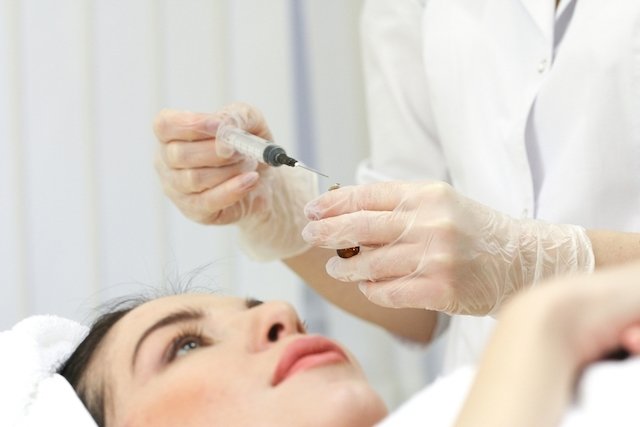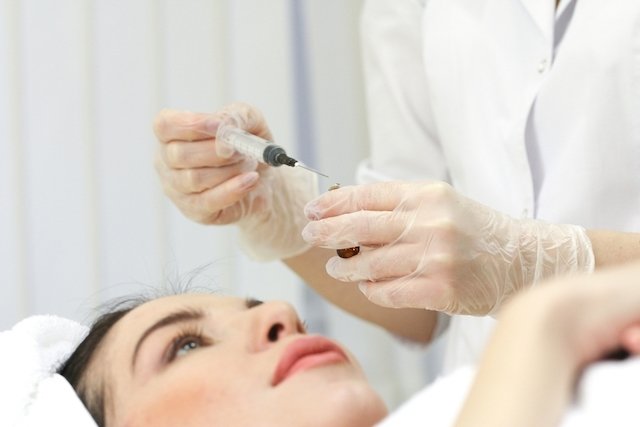Lip filler is an aesthetic procedure in which a liquid is injected into the inside of the lip to add volume, shape and make the lip fuller, providing better harmony between the lips and the face, or smoothing lines and wrinkles around the lips. .
There are several types of liquids that can be used to fill lips, however, the one most used is synthetic hyaluronic acid, a substance similar to hyaluronic acid naturally produced by the body. Collagen, on the other hand, has been used less and less in this technique because it has a shorter duration.
Typically, the effect of lip fillers lasts around 6 months, but may vary depending on the type of injection. For this reason, the plastic surgeon or dermatologist usually schedules a new injection close to this date so that there are no major variations in lip volume.

When is indicated
Lip filler is indicated for:
- Add volume, shape and structure to lips;
- Restore the size of the lip, which becomes thinner and without volume, with the natural aging of the body, exposure to the sun or smoking;
- Improve the appearance of the groove between the upper lip and the nasal septum, which can become longer and flatter with age;
- Correct the shape of the upper or lower lip, when they are different sizes;
- Smooth wrinkles or expression lines around the lips.
Furthermore, lip fillers, by harmonizing the aesthetics of the mouth in relation to the face, can help improve self-esteem and body image.
However, you should always consult a plastic surgeon or dermatologist to assess whether this procedure is the best way to obtain the expected results, before deciding to have fillers.
Furthermore, the ideal is to start with a small amount of injection and increase it over time, as large volume injections can cause a very sudden change in the physical appearance, which can harm self-image and self-esteem.
How to prepare
Some precautions are important to prepare for lip fillers, such as:
- Clarify all doubts about the procedure with your doctorrecovery and expectations;
- Report all medicationsvitamins and nutritional supplements that you take frequently, as some can affect recovery;
- Inform if you have any allergies or other health problem, such as high blood pressure or diabetes, for example;
- Inform your doctor about the use of anticoagulant medicationssuch as warfarin, heparin, rivaroxaban, acetylsalicylic acid or clopidogrel, as the doctor may advise stopping these medications a few days before the procedure;
- Tell your doctor if you have ever had cold soresas injection into the lips can increase the risk of new herpes attacks;
- Inform if you are pregnant or suspect pregnancyin the case of women;
- Avoid drinking alcoholic beverages at least 24 hours before the procedure;
- Avoid using retinoid creamsglycolic or anti-aging acid, at least 48 hours before the procedure;
- Avoid shaving, tweezing or using hair removal creamson the upper lip or other areas of the face close to the lips, at least 2 days before lip fillers.
Furthermore, on the day of filling, you should avoid using creams, moisturizers or makeup on your face.
How lip filler is done
Lip filler is a relatively quick technique that can be done in a plastic surgeon’s office.
To perform lip filling, the following steps are followed:
- Application of an anesthetic cream to the lips;
- Injection of hyaluronic acid into the lips, with a fine needle, which does not leave scars;
- Gentle massage on the lips, so that the treated lip area can absorb hyaluronic acid;
- Application of an ice pack for about 15 minutes to reduce swelling and bruising.
Lip fillers typically last about 30 minutes, and the doctor may ask the person to stay in the office for about 15 minutes after the procedure to monitor the development of side effects, such as nausea, dizziness, or bleeding from the lips.
What is recovery like?
Lip filler recovery is generally quick and easy, however, it is normal for lips to be swollen and more sensitive for around 48 hours after application. In some cases, swelling may remain for up to a week.
After the procedure, some precautions are important, such as:
- Apply a cold compress to the lip, for about 10 minutes, several times a day, as advised by the doctor, to reduce the body’s natural inflammation upon injection. When applying the cold it is important not to apply too much pressure;
- Avoid touching your lipsconsume drinks using a straw or kiss;
- Do not apply any type of product to your lipssuch as lipstick or lip balm, for at least one day after the procedure, to reduce the risk of infection;
- Be careful when brushing your teethso as not to cause irritation to the lips;
- Avoid physical exercise for at least 24 hours after the procedure;
- Avoid intense heat on the lipssuch as very hot baths, sauna, sun exposure, or using hot wax, for at least 10 to 12 hours after the procedure.
During recovery it is possible that the lips will lose some volume, due to the reduction of inflammation in the area, however, the day after the procedure, the volume present should be final. In some cases, during the first 12 hours there may also be minor discomfort when speaking or eating, due to inflammation.
Possible complications
Lip fillers are considered safe, however, like any other type of medical procedure, they have some risk of complications, such as bleeding or redness at the injection site, swelling of the lips, bruises, or very sore lips.
Normally, these effects disappear after the first 48 hours, but if they persist or worsen, it is very important to consult a doctor.
Additionally, reactivation of cold sores may occur, with the formation of blisters or wounds, tingling, pain and/or itching in the region where they appear. Know how to identify the symptoms of cold sores.
When to go to the doctor
It is important to seek medical help or the nearest emergency room if symptoms such as:
- Swelling of the lips that lasts more than a week;
- Itching around the lips;
- Intense pain in the lips;
- Redness that does not improve;
- Excessive bleeding;
- Lump on the lips;
- Discoloration at the site where the injections were made;
- Sores or stiffness on the lips;
- Feeling of heat or increased temperature in the lips;
- Fever or chills.
Furthermore, more serious complications may also arise, such as infections or severe allergic or anaphylactic reactions to the liquid injected or the anesthetic used. Know how to identify the symptoms of a serious allergic reaction.
Who shouldn’t do
Lip fillers should not be done by pregnant women, or by people with an active infection near the lips, active cold sores, sores on the lips, a weakened immune system or undergoing cancer treatment.
Furthermore, lip fillers should not be done by people who are allergic to hyaluronic acid, collagen or anesthetics.

Sign up for our newsletter and stay up to date with exclusive news
that can transform your routine!
Warning: Undefined array key "title" in /home/storelat/public_html/wp-content/plugins/link-whisper-premium/templates/frontend/related-posts.php on line 12
Warning: Undefined array key "title_tag" in /home/storelat/public_html/wp-content/plugins/link-whisper-premium/templates/frontend/related-posts.php on line 13




